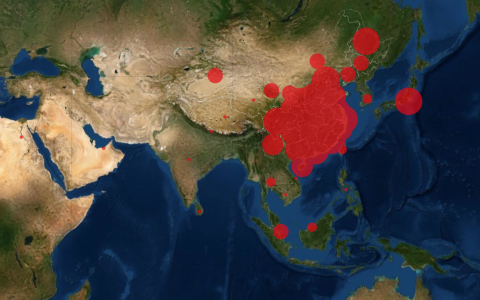
(Bloomberg) The sudden and dramatic drop of the markets — the S&P 500 down 11% last week — cannot be completely explained by fear about the coronavirus. Even if Covid-19 proves relatively deadly, it is not obvious it will lower longer-term corporate earnings by 11%. And it is plausible, though by no means assured, that a vaccine could be ready within a year.
So one way to think about Covid-19 is as a test of various systems around the world — political, medical and economic. Markets believe those systems are failing that test.
The transparency, resiliency and flexibility of the Chinese Communist Party, for example, are being questioned more seriously now than any time since its reforms began over 40 years ago. And observers seem to think Chinese governance is less stable and popular than they thought just a few months ago.
In the U.S., President Donald Trump and his administration are also being tested. After Trump was elected, there were widespread predictions of recession, wars and general disaster. For all the other outrages, those particular outcomes did not come to pass. With Covid-19, there is an obvious pattern of obfuscation and denial, and Vice President Mike Pence is being put in charge when an expert would be more appropriate.
Once again, opinions of the efficacy of the Trump administration, whether for Covid-19 or other matters, have to be downgraded. Once again, it is plausible to believe America is courting disaster.
There is a chance Covid-19 will prove a kind of Waterloo for the Trump administration. It may also increase the chances of some of the more radical Democratic presidential candidates, such as Bernie Sanders, who probably are not good for the stock market longer-term.
What about the European Union? Mistakes there have been less obvious. But European health systems don’t have a lot of spare capacity, most regions have been slow to initiate testing, and open-border arrangements may make Covid-19 difficult to contain. The prospect of Turkey opening European passage to Syrian refugees is another possible source of risk and tension.
Despite this list of specific concerns, there is a far more general reason that share prices may have fallen so much: because investors now have a better sense of what other investors think about risk. Before Covid-19, investors did not have much direct information about what other investors thought about the robustness of the global economy. Their expectations were not seriously being tested.
When a new shock to the system comes along, however, everyone gets to observe everyone else’s selling behavior. And investors have learned that the faith of their fellow investors is not as strong as they had thought. That raises the risk premium on holding stocks, and in turn causes share prices to fall more. Given how much this pandemic is a truly new event, and that the process of trading itself generates information about the forecasts of other investors, price volatility can be expected to continue.
It is no accident that yields on longer-term Treasuries have reached new lows, a classic sign of a flight to safety.
And there are still so many open major questions about Covid-19. I have been in touch with a number of public-health experts lately, and their estimates of the fatality rate range from 0.1% to 1%, or sometimes even 2%. In other words, they vary by a factor of 10 or 20. Also unknown is how robust international supply chains will prove to be, to what extent panic buying will arise, or how well workplace absenteeism plans will function.
It is good that Federal Reserve Chair Jerome Powell is aware of the risks. But does anyone really know how potent monetary policy will prove in limiting the costs of a coronavirus-driven economic slowdown? And no matter what your views on Keynesian macroeconomics, you probably shouldn’t be too confident about how much fiscal policy can address the current dilemma. Similarly, there is no clear precedent for estimating how much the flight to safety might cause financial crises and capital flight in some of the world’s weaker economies.
It’s difficult to understand a world in which expertise just doesn’t have a very good a handle on things. That is yet another reason why investors are spooked. To put it another way: The stock market is scared by the fact that it took so long for the stock market to be scared. And as much as investors may not want to hear it, they should probably expect further surprises.



